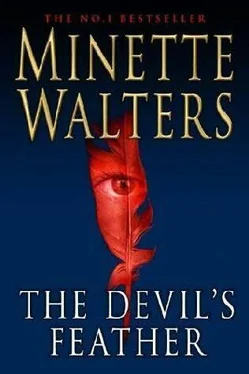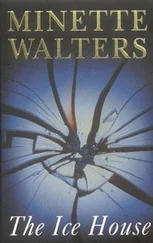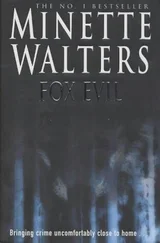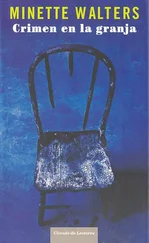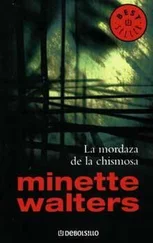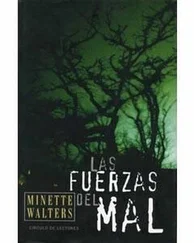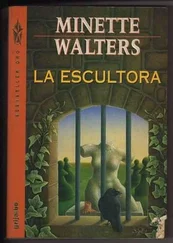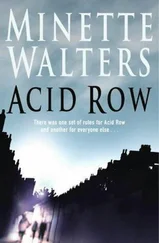It was why my mother had been so keen to leave. She knew the intimidation would be worse a second time, and she didn’t want to ask the workforce to intervene again. For Zanu-PF it was tantamount to treason for blacks to support their white employers, and Mum wasn’t prepared to see anyone die for the sake of a few square miles of land. She and my father chose to overlook the Barretts’ and Fortescues’ refusal to help-“they were afraid”-and turned out to support them when their own farms were invaded. But, privately, she never forgave them, and their lifelong friendships ended with my parents’ departure for England.
“So what’s the moral of the story?” I asked with a smile. “Don’t judge a book by its cover?”
“Something like that,” she agreed.
“And if Jess produces a carving knife?”
“Your doctor friend should be struck off for negligence,” said my mother rather dryly. “He shouldn’t have left you alone with a dangerous patient.”
I SUPPOSE I could have checked with Peter, but there didn’t seem much point. I decided my mother’s logic was sound. We make our decisions in life on who we believe as often as what we believe, and I had no reason to think the local doctor would wish a disturbed lunatic on to me. I was a lot less sure about Madeleine’s motives. There was no question she and Jess hated each other, and the old saying “Half the truth is a whole lie” applied to both. If I believed Jess, Madeleine had deliberately abandoned her mother to die of neglect; if I believed Madeleine, Jess was a dangerous stalker.
There was probably a grain of truth in both stories-Madeleine didn’t visit Lily as often as she might and Jess visited too often, which suggested jealousy was at the heart of their hatred-but I was discovering at first hand just how quickly whispers become accepted as fact. According to Dan Fry’s latest email, even Adelina Bianca was hinting that I’d faked my abduction. In an interview with an Italian magazine, she was quoted as saying: “Of course there’s money to be made out of pretending to be a hostage-the public loves horror stories-but anyone who does it belittles what the real victims go through.”
I’ve no idea if she was referring to me-there was a US deserter who faked his kidnapping before fleeing to the Lebanon-but that’s how her words were interpreted. Dan told me that four of the main terrorist groups had denied holding me, and the Arab press was full of articles claiming a foreign correspondent had sought to make money out of passing herself off as a victim. Thankfully, the Western press ignored it-either from fear of a libel suit or because they knew my story hadn’t appeared-but it made me even more reluctant to advertise where I was. It turned me against Adelina. I knew her words had probably been “rearranged” to suit the editor’s take, but I did wonder if the reason she was able to give interviews was because nothing much had happened to her.
When I finally went looking for Jess, she said she could always tell when Madeleine had been spreading her poison. It didn’t matter who the recipient was, or how sensible they were, they never smiled as freely afterwards as they’d done before. She said I’d tried harder than most but I’d made my interest in her wrists too obvious. She took the hint after a couple of days and left me to get on with it. There were some things in life that weren’t worth bothering with, and convincing strangers that she wasn’t planning to knife them was top of the list.
It was an interesting rebuttal, since I hadn’t told her I’d spoken to Madeleine. Was Madeleine so believable that everyone reacted in the same way? If so, it was frightening. I did ask Jess why she allowed half-truths to stand instead of coming out fighting, but she shrugged and said there was no point. “People believe what they want to believe,” she said, “and I refuse to be something I’m not just to prove them wrong.”
I couldn’t follow her logic. “In what way?”
“I despise them,” she said rather dryly, “and I’d have to pretend I didn’t if I wanted to change their minds.”
“You might feel differently if you got to know them.”
“Why? It won’t change the fact that they believed Madeleine.”
This was part of a conversation we had in her kitchen after I plucked up the courage to drive to her house. There was no alternative, since she hadn’t responded to either of my telephone messages, but I was terrified her mastiffs might be roaming free. I drove up the half-mile track to the farm and slowed to a halt in the middle of the yard while I tried to work out where her front door was. I had my window down because it was a rare day of sunshine in an otherwise wet month, and I heard the dogs barking furiously as soon as I put the gears into neutral. The sound was too loud for them to be inside and I looked around nervously to see where they were.
The house was separated from the yard by a beech hedge that was tall enough to mask the ground floor, but there was no obvious gap to suggest an entrance. To my left was a barn, and to my right the track appeared to follow the line of the hedge round a sharp corner at the far end of the house, although flashes of prowling mastiff behind the beech trunks persuaded me that getting out for the purpose of exploration was a bad idea. As I was pondering my options, I heard the sound of a powerful motor and a tractor came roaring around the bend, towing a hay baler behind it.
I had a brief glimpse of Jess’s scowling face before she swerved past me and into the barn. Half a second later, she reversed out again, missing the back of my car by six inches as the baler swung in the opposite direction from the tractor. She performed a neat three-point turn, with the tractor a whisker away from my wing mirror, before she reversed the whole contraption back under cover. She wasn’t taking any prisoners that day, and I’m sure I did look scared as a couple of tons of metal looked like flattening my Mini.
She killed the engine and jumped down from the cab, whistling to the dogs to quit their noise. “You’re in the way,” she told me. “Another time, park up by the hedge.”
I opened my door. “Sorry.”
“There’s nothing to be afraid of,” she said curtly. “I wasn’t trying to hit you.”
“I realize that. I’d have moved except I couldn’t tell which way you were going to turn…and I didn’t want to make matters worse.”
“The opposite of what you’d expect. I thought you grew up on a farm.”
“I meant the tractor.”
She crossed her arms. “Did you want something?”
“No. I just thought I’d…see how you are. You haven’t been around and you didn’t anwer my messages.”
To my surprise, a slight flush rose in her cheeks. “I’ve been busy.”
I pushed the car door wider. “Is this a bad time? I can come back later.”
“It depends what you want.”
“Nothing. I just came for a chat.”
She frowned at me as if I’d said something peculiar. “I have to unhitch the baler and grease it. You can talk to me while I do that if you like. You’re not dressed for it, though. The barn’s pretty messy.”
“That’s OK. Everything’s washable.” I climbed out of the car and picked my way across the rutted yard in my long wrap-over skirt and leather flip-flop sandals. She eyed me disapprovingly and I wondered what was offending her. “Is something wrong?”
“You look as if you’re going to a garden party.”
“I always dress like this.”
“Well, you shouldn’t. Not on a working farm.” She nodded to some sacks of potatoes inside the barn entrance. “You can sit on one of those. What do you want to talk about?”
“Nothing in particular.”
She eased the baler forward and worked it loose from the tractor tow before pushing it back against the wall. For a small woman, she had extraordinary strength. According to her, anyone could do anything when they needed to. It was mind over matter. Until it came to talking. Her expression said very clearly that if I expected her to start the conversation, I was going to be disappointed. I watched her take a handful of grease and work it into the twine-tying pivots.
Читать дальше
